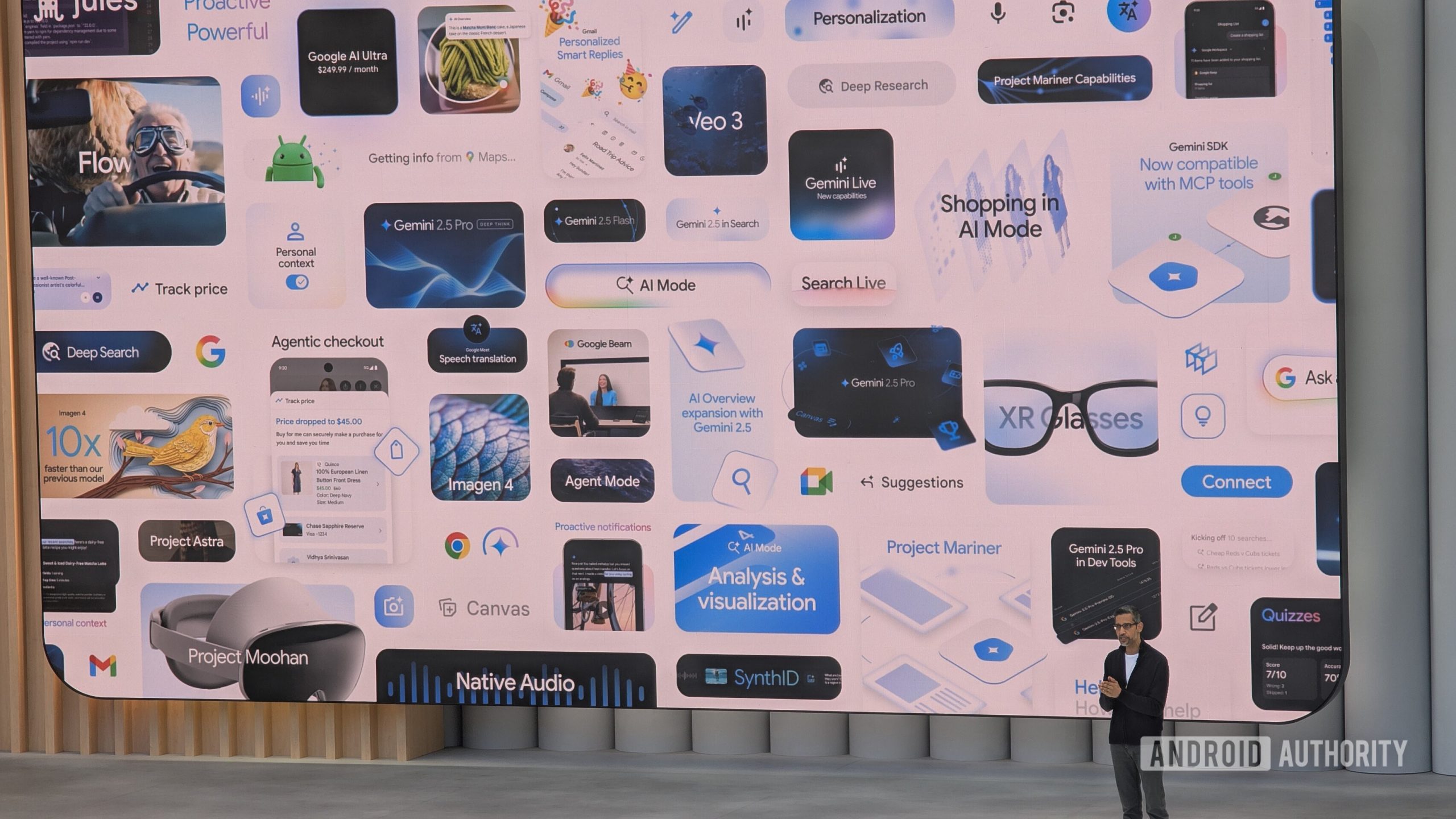At Google I/O 2025, the tech giant made headlines by announcing strategic collaborations with Samsung, Qualcomm, and eyewear brands Gentle Monster and Warby Parker to revolutionize the smart glasses space. These Android XR-powered smart glasses aim to redefine the way users interact with augmented and mixed reality, marking a significant move to rival Meta’s Ray-Ban Meta smart glasses.
This partnership signifies a major milestone in the tech industry’s evolution toward immersive computing. With Google, Samsung, and Qualcomm leveraging their combined hardware and software expertise, Android XR smart glasses are poised to become the next big thing in wearable technology.

Google’s Ambitious XR Vision Unveiled
Expanding Android XR Ecosystem
Google introduced its Android XR platform in partnership with Qualcomm and Samsung in 2023, focusing on developing a unified mixed reality (MR) and extended reality (XR) ecosystem. In 2025, this vision is expanding with the introduction of new smart glasses, aiming to make immersive technology more accessible and integrated into everyday life.
The smart glasses showcased at Google I/O 2025 are part of this larger initiative. Built on the Android XR platform and powered by Google’s Gemini AI, these glasses are designed to support a variety of tasks—blurring the lines between the digital and physical worlds.
Collaborative Power: Google, Samsung, and Qualcomm Unite
Building the Next-Gen XR Hardware and Software Stack
The partnership between Google, Samsung, and Qualcomm is pivotal in laying the foundation for a robust XR ecosystem. Samsung previously revealed its Project Moohan headset in late 2024 as part of this collaboration. Google confirmed at I/O 2025 that the headset is still on track for a launch later this year.
Beyond headsets, the trio is working on hardware and software reference designs to help developers create immersive XR experiences. The goal is to streamline development and foster innovation across smart glasses, AR headsets, and MR devices.
New Partnerships with Gentle Monster and Warby Parker
To merge technology with fashion and usability, Google has joined forces with Gentle Monster and Warby Parker, two renowned eyewear brands. This allows Google to create stylish yet functional smart glasses that appeal to mainstream consumers.
These collaborations are a direct response to Meta’s success with its Ray-Ban Meta glasses, signaling Google’s intention to compete strongly in the consumer wearable space.
AI-Enhanced Features with Gemini Integration
AI at the Core: Powered by Google Gemini
At the heart of these smart glasses is Gemini AI, Google’s latest artificial intelligence system. Gemini enables real-time functionality such as:
-
Voice-activated messaging
-
Navigation assistance
-
Calendar and schedule management
-
Live language translation
-
Smart photography and video capture
-
Contextual information delivery via notifications
The AI integration allows users to access critical information on-the-go, seamlessly overlaid within their line of sight using an optional in-lens display.
Smart Glasses Design and Components
Advanced Built-In Features
The concept glasses shown at Google I/O 2025 include:
-
Built-in Camera: For photography, video recording, and AI vision processing.
-
Microphone and Speakers: Enable hands-free calls, voice commands, and audio prompts.
-
Lens Display Module: Optional heads-up display for alerts and information.
These features mirror those found in Meta’s smart glasses, but Google takes it further by integrating Gemini AI for deeper context and user interactivity.
Developer-Focused XR Platform
Opening Opportunities for XR App Development
The Android XR platform is now more robust than ever, thanks to ongoing collaboration with Qualcomm and Samsung. Google is encouraging developers to build apps tailored for smart glasses and headsets, offering open-source tools, SDKs, and support.
The platform supports spatial computing and real-world anchoring, enabling new experiences in education, gaming, navigation, productivity, and communication.
Real-World Testing and User Feedback
To ensure the smart glasses are user-ready, Google has begun distributing early versions to selected testers. These users will provide crucial feedback on real-world usability, comfort, interface design, and overall performance. The insights gathered will help refine the final product before mass production and public release.
Competing with Meta in the XR Space
Direct Challenge to Ray-Ban Meta Glasses
Google’s announcement and product showcase at I/O 2025 send a clear message: the company is ready to take on Meta in the smart eyewear race. With better AI integration, fashion-forward design, and deeper Android ecosystem support, Google’s offering is designed to appeal to both tech enthusiasts and general consumers.
Looking Ahead: What’s Next for Android XR?
As Google continues to build its XR ecosystem, users can expect more product announcements, third-party partnerships, and AI-enhanced wearables in the near future. This initiative aligns with Google’s long-term goal of making spatial computing mainstream, where technology becomes more intuitive and integrated into everyday environments.
FAQs:
Q1. What are Android XR smart glasses?
Android XR smart glasses are wearable devices powered by Google’s Android XR platform that blend AI, augmented reality, and mixed reality to provide real-time interaction and information through glasses.
Q2. Who are Google’s partners for the smart glasses project?
Google has partnered with Samsung, Qualcomm, Gentle Monster, and Warby Parker to design and build stylish, functional, and AI-integrated smart glasses.
Q3. What is Project Moohan?
Project Moohan is Samsung’s mixed reality headset developed in collaboration with Google and Qualcomm, expected to launch later in 2025 as part of the Android XR ecosystem.
Q4. What can Google’s smart glasses do?
They can assist with messaging, navigation, real-time translation, appointment scheduling, and photography—all powered by Google Gemini AI.
Q5. Are Google’s smart glasses a competitor to Meta’s Ray-Ban Meta glasses?
Yes, Google’s smart glasses are a direct challenge to Meta’s offerings, offering similar hardware capabilities but enhanced with Google’s powerful Gemini AI and Android ecosystem integration.




